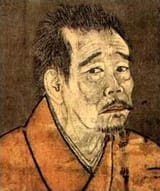"If you are thirsty," Ikkyū said, "you dream of water; if you are cold, you dream of a warm coat; as for me, I dream of the pleasures of the boudoir—that's my nature!"[12] Ikkyū also took seriously Huineng's teaching that "outside of licentiousness, there is no true Buddha-nature."[13][note 2] For Ikkyū, sex was a form of spiritual practice. He regarded sex in light of the nonduality of desire and bodhi, and it also served as a means for him to test his own sense of enlightenment as well
Rinzai's disciples never got the Zen message,
But I, the Blind Donkey, know the truth:
Love play can make you immortal.
The autumn breeze of a single night of love is better than a hundred thousand years of sterile sitting meditation . . .
Stilted koans and convoluted answers are all monks have,
Pandering endlessly to officials and rich patrons.
Good friends of the Dharma, so proud, let me tell you,
A brothel girl in gold brocade is worth more than any of you.
Ikkyū praised "pavilion girls" who, unlike priests whose minds were filled with philosophical dialectics, existed in a state of no-mind, facing the present moment immediately and without calculated thinking or regrets. This was to act free of the logically-structured mind.[19] Ikkyū also came to embrace the view found in Esoteric Buddhism that the real Buddha is none other than one's own body. Thus, when he practiced Zen, he practiced with the body as well as the mind.[20] Such a tantric attitude, which also draws on the language of alchemy, can be seen in the following:
A sex-loving monk, you object!
Hot-blooded and passionate, totally aroused.
But then lust can exhaust all passion,
Turning base metal into pure gold.
The lotus flower
Is not stained by the mud;
This dewdrop form,
Alone, just as it is,
Manifests the real body of truth.
